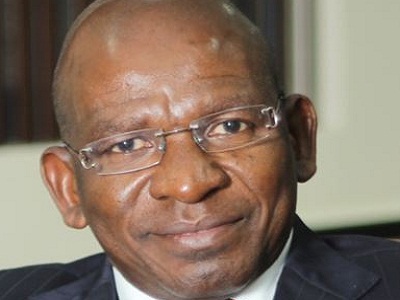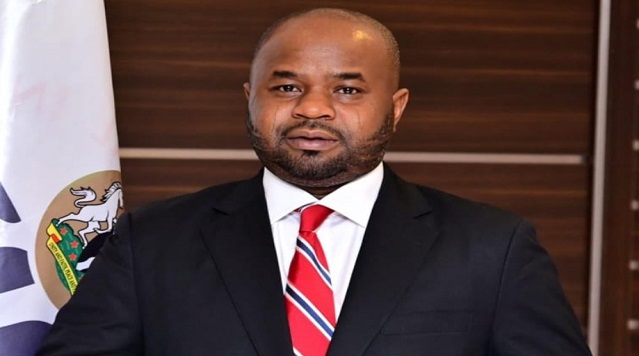News
Ezekwesili Harps on Technology as Africa’s Lasting Solution to Problems

Oby Ezekwesili, Public Policy Analyst and Senior Economic Advisor, has said that technology is the solution to problems facing Nigeria and Africa as she called for investment in infrastructure that would aid emergence of digital services in rural communities.

Ezekwesili divulged this at the weekly GageLive Instagram platform organised by Gage Awards on the theme, “Using Technology to Shape the Nigeria of The Future,” recently.
“What the digital world can offer citizens is limited. This is because it is mostly within the urban city. Beyond the urban city, the grade of the physical infrastructure – the digital infrastructure, the backbone is still not at the level of solidity, strength, performance and efficiency as should happen.”
Continuing, the BBOG co-founder noted: “Even today, when you and I are in this kind of a programme, we are not optimised because the quality of our connection is still fragile – very poor.”
She warned, however, that until Nigeria, Africa invest in the digital infrastructure that would facilitate their interconnection and their reach, “We will not be able to say that we are at a place of efficiency”.
According to the analyst, in terms of speed – a function of productivity, as long as technology and digital format are not giving us the level of speed that is a global approach of internet speed, then we are way below it.
Her words: “From the last number I checked, we were significantly more than 80 per cent below global speed in terms of internet. That is something to deal with.”
While responding to questions on the live programme, Ezekwesili highlighted that a lot of citizens were still in rural communities. And the rural environment does not make market scale for the private sector to offer digital service.
She proffered: “When there is a market failure, it is the government that must step in. So, rural infrastructure should support the kind of backbone that we need in order to provide digital content to the rural community.”
Noting that the rural communities are abode other than urban poor, she expressed that the real poverty is within the rural communities of Africa.
“We need to invest massively in the kind of infrastructure that would support the emergence of digital services in the rural communities of the continent.”
Again, she stressed on digital platforms that carry the content of what one wants to convey. “Look at digital platform for commerce, example, they are still in novelty on our continent. Now that we see what COVID-19 can do, hopefully what is going to happen is that we are going to realise that a lot of our lives will depend online”.
She, therefore, urged Africans to build – whether they are at macro or micro level platforms that enable us to convey messages and the things that are not so to print, adding that that would help enormously to expand the scope.
Sadly, she bemoaned the poor level of digital financial inclusion. “Digital financial services is something that is lacking. In the time of orthodox banking, it was difficult for banks to establish their branches all over the country.
“Even when they were mandated, many times they would set a goal for how many branches that needed to be set up. But the banks were always underperforming.
Speaking further, she added that in the same way, now that “We are going digital and trying to use technology to create financial inclusion, we still have barriers to that”
The economist, however, described one of the key barriers; forms of identification, as the major problem of Africa. “And technology is the solution to that problem of identity”.
For her, the unique identity that enables a person to become at par with the digital financial services is something that Africa would need to invest in. “And we have not yet invested in it as much as we should”.
She decried another sad part. “There is a vast body of public policy that is very necessary. Public policy is at the heart of showing readiness to migrate from one level of understanding of issues of development to a higher level of things”.
“Our public policy is trailing technology. It is way behind the curve of the rapid expansion of technology. So, you have a situation where people who are technophobes are the ones making policies around issues of technology.
To upgrade to a global standard, Ezekwesili advised: “We are going to have a problem. They don’t see how important it is to be in a hurry. We must be in a hurry. Our policies and laws have to reflect that”.
Not forgetting the many laudable series GAGE Awards has put up for the Nigerian youths, Ezekwesili commended the CEO of Gage Awards, Mr. Johnson Anorh.
GAGE Awards is an internet award conceptualised to reward excellence in digital application and online presence. It’s weekly InstagramLive show is part of the GAGE Awards plans of using its platform to shine the light on those who have used the digital space ingeniously.
In the words of the CEO, “These people who have used the digital space ingeniously share their story and get to inspire those looking to do great things on that space.”
“We have GageLive on Instagram once every week. But since the lockdown we have been having it more frequently to get to inspire those at home to do great things, since we now have time on our hands,” Anorh noted.
News
Trump Says He Made no Mistake Sharing Video Depicting Obamas as Apes

United States President Donald Trump has said he made no mistake for a video briefly shared on his official Truth Social account that depicted former President Barack Obama and former First Lady Michelle Obama as apes.

Former President Barack Obama
Speaking late Friday to reporters accompanying him aboard Air Force One, Trump insisted he made no mistake by sharing the video and does not need to apologise.
“I didn’t make a mistake,” he said.
Trump explained that he did not watch the entire clip before it was posted.
“I didn’t see the whole thing. I looked at the first part, and it was really about voter fraud in the machines, how crooked it is, how disgusting it is.
“Then I gave it to the people. Generally, they look at the whole thing. But I guess somebody didn’t,” he said.
When asked directly whether he condemned the video’s content, Trump replied, “Of course I do.”
The video, which was posted late Thursday, pushed a conspiracy theory about voting machines used during the 2020 election and included a racist depiction of the Obamas.
It remained on Trump’s Truth Social account for about 12 hours before being deleted on Friday morning, following widespread bipartisan calls for its removal.
The White House initially defended the post in an emailed statement to reporters on Friday morning by Karoline Leavitt, Press Secretary,.
She said, “This is from an internet meme video depicting President Trump as the King of the Jungle and Democrats as characters from The Lion King.”
Leavitt added, “Please stop the fake outrage and report on something today that actually matters to the American public.”
Hours after the statement was issued, the video was removed from Trump’s official Truth Social account.
News
Orya, Ex-NEXIM MD Jailed 490 Years for N2.4Bn Fraud

Robert Orya, former managing director, Nigerian Export-Import Bank, (NEXIM), has been sentenced to a cumulative 490 years’ imprisonment over a N2.4 billion fraud, following his conviction by a Federal Capital Territory (FCT) High Court in Abuja.

The conviction was secured by the Economic and Financial Crimes Commission (EFCC). Justice F. E. Messiri sentenced Orya to 10 years’ imprisonment on each of the 49 counts brought against him, with the sentences running cumulatively.
Orya, who headed NEXIM Bank between 2011 and 2016, was prosecuted by Samuel Ugwuegbulam, EFCC counsel.
The anti-graft agency accused him of fraudulently diverting funds belonging to the bank—charges the court held were proven beyond reasonable doubt.
Delivering judgment, Justice Messiri ruled that the prosecution successfully established its case, finding the former bank chief guilty on all 49 counts of fraud.
The conviction has been widely linked to the renewed momentum within the EFCC under Mr. Ola Olukoyede, its Chairman, whose leadership has seen a reinvigoration of the agency’s resolve to pursue high-profile corruption cases to their logical conclusion.
Since assuming office, Olukoyede has repeatedly vowed that no individual, regardless of status or past influence, would be shielded from accountability.
Under his stewardship, the EFCC has intensified the prosecution of complex financial crimes, particularly cases involving public institutions and large-scale diversion of funds.
Observers say the sentencing of a former chief executive of a government-owned bank underscores the EFCC’s determination to restore public confidence in the anti-corruption fight and sends a strong signal that financial misconduct will attract severe consequences.
The judgment is regarded as one of the most significant convictions secured against a former banking chief in recent years, reinforcing the agency’s resolve to clamp down on economic crimes within Nigeria’s financial sector.
During his tenure at NEXIM Bank, Orya was initially credited with efforts to reposition the institution to support non-oil exports and improve its financial standing after earlier setbacks.
However, his administration later became enmeshed in controversies, including allegations of loan disbursement irregularities and procedural abuses.
The case, which culminated in Thursday’s judgment, centred on findings that Orya diverted public funds estimated at N2.4 billion—offences that ultimately led to his conviction and lengthy prison sentence.
News
NRS Chairman Outlines Ways Nigeria can Move from Potential to Economic Prosperity

Zacch Adedeji, chairman of the Nigeria Revenue Service (NRS) has called for a paradigm shift in dependence on raw material exports to one that embrace ideas, innovation and the production of complex products as a pathway to sustainable economic growth and national prosperity.

Adedeji made the submission while delivering the maiden distinguished personality lecture of the Faculty of Administration, Obafemi Awolowo University (OAU), Ile-Ife, Osun State, on Thursday.
A statement by his Special Adviser on Media, Dare Adekanmbi, said Adedeji, in the lecture entitled, ‘From Potential to Prosperity: Export-led Economy’, stressed the need to rethink growth through the lens of complexity by not just producing more of the same stuff.
He lamented that Nigeria possesses a high-tech oil sector and low-productivity informal sector as well as lacking “the vibrant, labour-absorbing industrial base that serves as a bridge to higher complexity.”
The NRS boss stated that Nigeria witnessed stagnation in its exportation drive for three decades between 1998 to 2023, and only added six new products in its export basket list between 2008 and 2023.
“Because of our current position, the Harvard Atlas concluded that we are positioned to take advantage of very few opportunities to diversify using what we already know.”
Adedeji urged Nigeria to learn from the world by comparative study of success and failure like Vietnam, Bangladesh, Indonesia, South Africa and Brazil.
“We are not just looking at numbers in a vacuum; we are looking at the strategic choices made by nations like Vietnam, Indonesia, Bangladesh, Brazil, and South Africa over the same twenty-five-year period. While there are many ways to under perform, the path to success is remarkably consistent: it is defined by a clear strategy to build economic complexity.
“When we put these stories together, the divergence is clear. Vietnam used global trade to build a resilient, complex economy, while the others remained dependent on natural resources or a single low-tech niche.
“There are three big lessons here for us in Nigeria as we think about our roadmap. First, avoiding the resource curse is necessary, but it is not enough. You need a proactive strategy to build productive capabilities.
“Vietnam’s success came from integrating itself into Global Value Chains (GVCs). They positioned themselves as the assembly hub for the world’s electronics, importing high-tech parts and exporting finished products.
“This allowed them to “borrow” technology and management skills from abroad to build their own know-how.
“Nigeria, on the other hand, remains a supplier of raw materials to these chains, not an active participant within them. We must realise that productive capabilities are not permanent. The examples of South Africa and Brazil show us that you can actually lose your industrial edge if you are not careful. Over-reliance on the easy path of resource extraction creates economic and political incentives that crowd out the difficult, long-term work of building an industrial base.”
He added that for Nigeria, which is at an even earlier stage of development and even less diversified than these nations, the warning is stark.
“Relying solely on our natural endowments isn’t just a path to stagnation; it’s a path to regression. The global economy increasingly rewards knowledge and complexity, not just what you can dig out of the ground. If we want to move from potential to prosperity, we must stop being just a source of raw materials and start being a source of ideas, innovation, and complex products.
He added that President Bola Tinubu has already begun the difficult work of rebuilding the economy to ensure collective knowledge to innovate, produce and build a resilient economy.
“The journey from potential to prosperity is not a short one, but with the right map and the right resolve, it is a journey we can finally complete,’ he added.

 General News2 days ago
General News2 days agoGlobacom Donates ₦1Bn to Lagos State Security Trust Fund

 Telecom3 days ago
Telecom3 days agoMTN Guns for $2.76bn IHS Towers Buyout in African Telecom Power Grab

 Telecom2 days ago
Telecom2 days agoAirtel Nigeria Commits to Upgrade of its Network Infrastructure for Improved Quality of Service

 E-Financial3 days ago
E-Financial3 days agoIncentives alone won’t win over Africa’s next billion fintech users — Kuda MFB MD

 Telecom3 days ago
Telecom3 days agoGoogle Calls on Africa’s AI Trailblazers for 10th Startup Accelerator Cohort

 E-Business3 days ago
E-Business3 days agoFirm Reviews the Evolution of Phishing Threats in 2025

 E-Business2 days ago
E-Business2 days agoPwC Reveals AI Scaling Gap Slows Africa’s Digital Transformation

 General News3 days ago
General News3 days agoEdTech Platform Unveils over 5,000 Self-Paced Courses for Skills, Knowledge, and Literacy





















